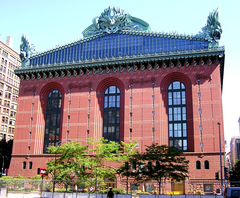Chicago Public Library
 The library seal contains the Y-shaped Chicago municipal device |
|
 |
|
| Established | 1873 |
|---|---|
| Location | Chicago, Illinois, United States |
| Branches | 79 |
| Collection | |
| Size | 5,721,334 volumes (July 2010, ALA data) |
| Access and use | |
| Circulation | 10 million |
| Population served | 2.8 million |
| Other information | |
| Budget | $106,000,000 |
| Director | Brian A. Bannon |
| Website | chipublib.org |
The Chicago Public Library (CPL) is the public library system that serves the City of Chicago in the U.S. state of Illinois. It consists of 80 locations, including a central library, two regional libraries, and branches distributed throughout the city's 77 Community Areas.
The American Library Association reports that the library holds 5,721,334 volumes, making it the 9th largest public library in the United States by volumes held, and the 30th largest academic or public library in the United States by volumes held. The Chicago Public Library is the second largest library system in Chicago by volumes held (the largest is the University of Chicago Library). The library is the second largest public library system in the Midwest, after the Detroit Public Library.
In the aftermath of the 1871 Great Chicago Fire, Londoner A.H. Burgess, with the aid of Thomas Hughes, drew up what would be called the "English Book Donation," which proposed that England should provide a free library to the burnt-out city. The Chicago Public Library was created directly from the ashes of the great Chicago Fire. Burgess wrote on December 7, 1871 in the London Daily News that "I propose that England should present a Free Library to Chicago, to remain there as a mark of sympathy now, and a keepsake and a token of true brotherly kindness forever..."
After circulating requests for donations throughout English society, the project donated 8,000 books. Private donors included Queen Victoria, Benjamin Disraeli, Alfred Lord Tennyson, Robert Browning, John Stuart Mill, John Ruskin, and Matthew Arnold.
...
Wikipedia
